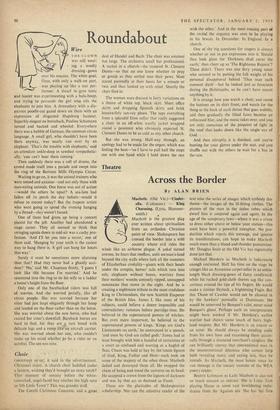Roundabout
Wire
THE CLOWN
was still wear- ing a woolly dressing - gown over his sequins. The white goat, Omo, with only a walk-on part, was playing 'up like a star per- former. former. A dwarf in gym tunic and boater was experimenting with a hula-hoop, and trying to persuade the girl who oils the elephants to join him. A dromedary with a dis- astrous poodle-cut gazed down on them with an expression of disgusted Hapsburg hauteur. Superbly elegant on horseback, Paulina Schumann turned and backed and wheeled. Everywhere there was a babble of German, the common circus language. A small girl, who shouldn't have been there anyway, was nearly run over by an elephant. 'That's the trouble with elephants,' said an attendant ankle-deep in sawdust sympathetic- ally, 'you can't hear them coming.'
Then suddenly there was a roll of drums, the crowd made itself into a parade and swept into the ring of the Bertram Mills Olympia Circus.
Waiting to go on, it was the animal trainers who were tensed and anxious—and not only those with man-eating animals. One horse was out of action —would the others be upset? A sea-lion had fallen off its perch the day before—would it refuse to mount today? But the trapeze artists who were going to spend the evening hanging by a thread—they weren't fussed.
One of them had given up being a concert pianist for the job. Another had abandoned a stage career. They all seemed to think that swinging upside down in mid-air was a cushy pro- fession. `And I'll let you into a secret,' one of them said. 'Hanging by your teeth is the easiest way to hang there is. A girl can hang for hours that way.'
Surely it must be sometimes more alarming than that? Had they never had a ghastly acci- dent? 'No,' said Mr. Chapman firmly, 'I guess I look like this because I'm married.' And he sauntered into the ring to tie his wife to a ladder a house's height from the floor.
Only one of the barebacked riders was full of worries. And she worried jovially, like all circus people. She was worried because her sister had just leapt elegantly through her hoop and landed on the floor rather than on the horse. She was worried about the new horse, who had caused her sister's downfall. Bareback horses are hard to find, for they are a rare breed with delicate legs and a rump like an aircraft carrier. She was worried about her son, who couldn't make up his mind whether Ito be a rider or an acrobat. The son was nine.
Choir
CHRISTMAS MUSIC, it said in the advertisement. Christmas music. A church choir huddled under a lantern, wishing they'd brought an extra torch? That moment of anxiety before the white- caSsocked, angel-faced boy reaches the high note in 'Oh Little Town'? This was grander stuff.• The Corelli Christmas Concerto, and a great deal of Handel and Bach. The choir was amateur but large. The orchestra small but professional. A recital in a church—the restored St. Clement Danes—so that no one knew whether to pray or gossip as they settled into their pews. Most stared pointedly at their boots for a minute or two, and then looked up with relief. Shortly the choir filed in.
The women were dressed in forty variations on a theme of white top, black skirt. Short office skirts and dropping Spanish skirts and brisk housewifely sun-ray pleats. The tops everything from a splendid Eton collar that really suggested a choir to an off-white woolly jacket wrapped round a pessimist who obviously expected St. Clement Danes to be as cold as any other church.
But she was wrong. Half-way through, an apology had to be made for the organ, which was feeling the heat—`so I have to pull half the stops out with one hand while I hold down the rest with the other.' And in the most rousing part of the recital the organist was seen to be playing in his braces. In December. In England. In a church.
One of the big questions for singers is always whether or not to put expression into it. Should they look glum for 'Darkness shall cover the earth,' then cheer up as The Righteous Rejoice'? These didn't. There was one fiery young tenor who seemed to be putting the full weight of his personal disapproval behind 'Thus man each moment dieth'—but he looked just as ferocious during the Hallelujahs, so he can't have meant anything by it.
It is strange how you watch a choir, and count the buttons on its shirt front, and watch for the thing at the back of each throat that goes wobble, and then gradually the lifted faces become an unfocused blur, and the music takes over, and you are only conscious of the pinpoint of light in the roof that looks down like the single eye of God. . . .
And then abruptly it is finished, and you're hunting for your gloves under the seat, and you shuffle out with the others to wait for a bus in the rain.










































 Previous page
Previous page